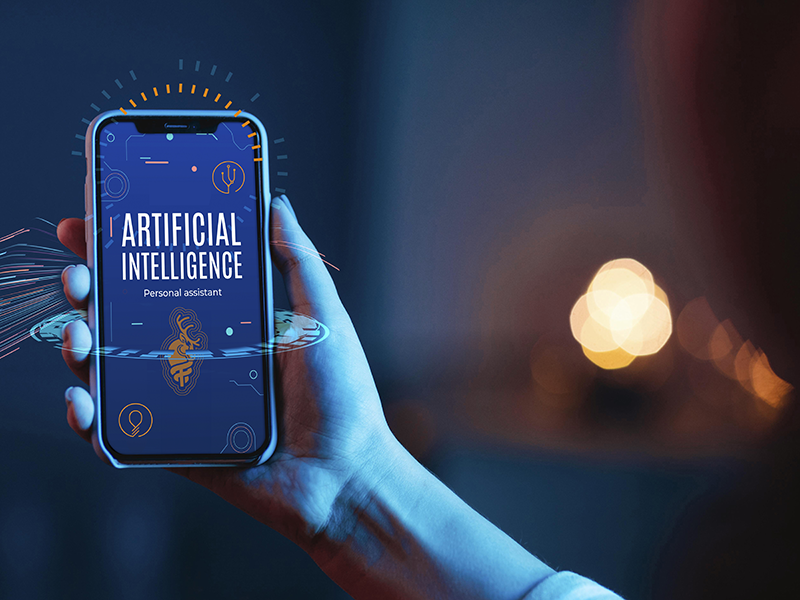
Imagine a world where my AI emails your AI to schedule a meeting for us over coffee. The next thing you know? We're discussing campaign strategies over lattes and it’s all thanks to our digital matchmaker. Welcome to the future of healthcare marketing, where AI isn’t just a concept – it’s the new normal.
It feels like a scene from a sci-fi movie, but that’s the reality of today’s AI-driven marketing landscape. Agencies no longer have a choice but to embrace this new era where it is more than a tool – it’s a paradigm shift in understanding and reaching patients.
Think of artificial intelligence as the friendly, non-playable character (NPC) in a video game. It can help guide you through levels of patient segmentation and engagement and offer insights and strategies that only a digital oracle can provide. That’s why it’s time for agencies to gear up and learn how to navigate this exciting new frontier.
AI doesn’t just analyze data. It also dives into the digital universe to extract information regarding patient behavior, preferences, and needs. It can quickly build a knowledge graph to predict future trends and opportunities to meaningfully connect with your target audience by providing a whole new level of personalization to your marketing efforts.
In other words, AI really can be thought of as your trusted sidekick in a strategy game – one who knows exactly where to find hidden marketing treasures to help your agency. Here are a few key ways AI can help.
AI assistants are remarkably efficient at gathering and synthesizing data to provide actionable summaries and knowledge graphs informed by vast amounts of research from multiple sources. Deploying a crew of AI assistants, each with specialized roles and tasks, is like having a box of researchers at your fingertips who are ready to collaboratively parse through data, identify trends, and generate insights. Together, they become a formidable task force that can produce a holistic and strategic game plan from fragmented information.
AI-driven tools help agencies push the boundaries of content creation. For example, by utilizing AI for synthetic voiceovers, we can craft narrations that cater to a global audience by easily translating a single script into a multitude of languages and dialects. Video generation AI can produce engaging visual content faster than ever before to help keep up with the real-time demands of social media and digital marketing. Additionally, these tools can generate customizable imagery that enable brands to create compelling, on-brand, and ownable content for diverse audiences.
Directed by the agency’s creative alchemists, these digital helpers are generated to resonate with consumers across the virtual marketing landscape to help forge deeper connections with the brand’s target audience. But these AI narrators aren’t just another voice in the crowd – they're the new-age influencers guiding today’s personalized marketing era.
In the dynamic landscape of AI-driven healthcare marketing, decision intelligence (DI) is a pivotal element when it comes to harmonizing vast data streams with marketing acumen. DI is like an agency’s strategic nerve center, seamlessly integrating AI and large language models (LLMs) to distill data into actionable insights for personalized marketing strategies. It’s like having an astute advisor who not only predicts, but also shapes, patient engagement with precision.
This approach enables healthcare marketers to make swift, informed decisions that enhance their connection with both patients and healthcare professionals. By adopting DI, agencies will evolve into a sophisticated fusion of data science and creative strategy to produce impactful campaigns that resonate with their target audience and activate them to take brand-specific action.
Develop Websites: Technical virtual assistants provide real-time suggestions and code corrections to help streamline the development process and enhance agency productivity. With this AI safety net in place, it also allows developers to apply their creativity and expertise to more strategic and creative projects without sacrificing the quality of their work.
Optimize Internal Processes: AI is the ultimate agency sidekick, zipping through digital hallways, efficiently sorting tickets, and streamlining communication between teams. It's like having a virtual concierge for new hires that can answer their questions by dipping into the agency's knowledge pool. It eliminates the need to hunt down assets or wade through data swamps. By assigning the minutiae of agency life to AI, it frees up your experts to get back to advancing the healthcare industry with their innovative marketing magic.
The above scenarios exemplify AI’s unparalleled ability to enhance how healthcare marketers think, work, and connect with patients and providers –and solidify its role in healthcare marketing.
To create compelling campaigns that can connect and communicate with a variety of consumers, it requires the capacity to account for their different backgrounds, behaviors, needs, and preferences. That’s where AI becomes more than just a valuable tool – but a necessary one. It extends our ability to segment audiences, understand their behaviors and needs, and produce increasingly personalized, compelling, and relevant content.
By automating certain time-consuming tasks, AI ultimately frees up agency experts and allows them the time to tap into their expertise to deliver more strategic and creative solutions to their clients.
AI-powered technologies, platforms, and tools are rapidly evolving. To navigate this new landscape ethically, we must establish a rigorous set of guardrails to ensure they are being used responsibly.
It’s imperative to set up “human-in-the-loop” systems to ground AI’s tendency to “hallucinate,” which means to generate misleading or incorrect results. Marketers must also ensure that robust data security systems are in place. It’s also important for organizations to codify guidelines for transparency and disclosure of their use of AI, as well as taking the time to understand intellectual property to protect themselves against copyright infringement.
Finally, it’s crucial to assess if the datasets being leveraged represent diverse patient populations to accurately understand patient needs without bias – and make any necessary adjustments.
Once these guidelines are in place, marketers are ready to embrace the full power and potential of AI to streamline their organization’s operations, personalize the patient experience, and do their part to transform the future of the healthcare marketing industry.
